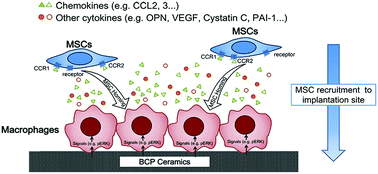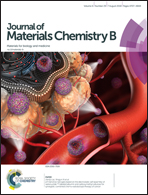Calcium phosphate altered the cytokine secretion of macrophages and influenced the homing of mesenchymal stem cells†
Abstract
Immune cells such as macrophages play an important role in tissue regeneration. In this study, an in vivo mouse intramuscular implantation model was applied to demonstrate the gradual infiltration of macrophages, followed by homing of mesenchymal stem cells (MSCs) during the early phase of biphasic calcium phosphate (BCP)-induced ectopic bone formation. Then, a novel real-time cell analysis (RTCA) system was used to continuously monitor cell migration in vitro, suggesting the positive roles of BCP-mediated macrophage secretion in MSC recruitment. A Proteome Profiler cytokine array was also applied to investigate the BCP-stimulated secretion pattern of macrophages by simultaneously screening 111 cytokines, indicating that Raw 264.7 macrophages released a pronounced amount of chemokines (CCL2, 3, 4, 5 and CXCL2, 10, 16) and non-chemokine molecules (OPN, VEGF, CD14, Cystatin C and PAI-1), which are involved in cell homing and bone regeneration. Among them, osteoinductive BCP ceramics significantly promoted the secretion of CCL2, 3, 4 and Cystatin C in macrophages, which was consistent with the up-regulated expression of chemokine genes (Ccl2, 3, 4). Considering their previously-reported chemotactic functions, the effects of CCL2/MCP-1 and CCL3/MIP-1α on MSC recruitment were further evaluated by the RTCA system. It was found that exogenous CCL2/MCP-1 and CCL3/MIP-1α dramatically accelerated MSC migration, while their neutralizing antibodies reduced MSC motility. Moreover, BCP-mediated macrophage secretion up-regulated the gene expression of chemokine receptors (Ccr1 and Ccr2) in MSCs, but the blockage of CCR1 and CCR2 exerted inhibitory effects on MSC chemotaxis. RTCA results showed that compared to CCL3/CCR1, the CCL2/CCR2 axis might exert a predominant chemotactic effect for MSC recruitment. These findings indicated that osteoinductive BCP ceramics might regulate macrophage secretion via an ERK signaling pathway, and the increased release of chemokines in macrophages would accelerate MSC homing to facilitate bone formation. These findings might deepen our understanding of biomaterial-mediated immune response and help to design orthopedic implants with desired immunomodulatory abilities to recruit host stem cells endogenously for bone regeneration.



 Please wait while we load your content...
Please wait while we load your content...